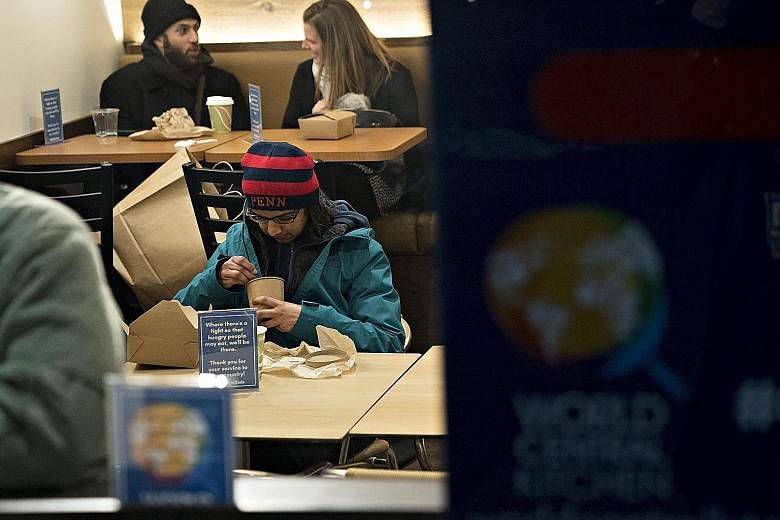WASHINGTON • The United States government shutdown is causing some real pain, but economists are largely brushing off the risk to growth.
Analysts project the government will reopen by mid-February, though if the closure lasts to March, the disruptions will cause economic growth to dip below 2 per cent this quarter, according to the median forecast in a Jan 15 to 17 Bloomberg survey. At the same time, just under half say the shutdown increases the probability of a recession this year.
The relatively sanguine assessment is at odds with some more dire recent predictions, including by Deutsche Bank and the White House itself doubling the estimated negative fallout.
Even so, the shutdown adds risk at a time when the economy is already projected to slow; forecasters see the highest recession risk in six years, manufacturing is faltering and consumers and investors are getting more skittish.
"If the shutdown keeps going on throughout the first quarter, it'll be costly for growth," said Mr Ryan Sweet, head of monetary policy research at Moody's Analytics. While it probably will not end the expansion given the momentum at the start of the year, "it could leave a more lasting impression, weighing on business confidence, consumer sentiment and investor confidence".
A separate Bloomberg survey of economists earlier this month raised the probability of a recession in the next 12 months to 25 per cent, the highest in more than six years, amid the shutdown and trade war. A Federal Reserve Bank of New York gauge put the chance at 21 per cent a year from now, the highest since 2008.
In the first quarter, the shutdown will shave 0.25 percentage point from economic growth, according to the median of 30 responses in the survey. A slight majority of forecasters also said the full-year pace of expansion will be affected. Among those who do expect an impact, 2019 growth will be cut by 0.13 percentage point, according to the median estimate.
With the closure since Dec 22 now the longest in US history, there is no sign from US President Donald Trump or Congress that an agreement is near.
A majority of those polled this week said the closure will end on Feb 1 to 14, while just above a third estimated it would end this month. One saw a conclusion around Feb 15 to 28 and another saw the closure extending into March.
"Uncertainty is adding to the gloom, along with concerns about the fading boost from tax cuts and government spending stimulus, geopolitical risks and higher borrowing costs," said Mr Bernard Baumohl, chief global economist at The Economic Outlook Group.
"With every week, the shutdown has an incrementally larger impact. That's begun to cast a dark picture among many business leaders, certainly among CFOs, that the economy is in trouble and could end up in a recession," Mr Baumohl said.
He does not forecast a recession this year, and estimates a one-in-three chance of a slump next year.
The shutdown also may affect the jobless rate, as hundreds of thousands of furloughed government workers could be classified as unemployed. The survey median is for a January unemployment rate of 4 per cent, rather than holding steady or edging down from last month's 3.9 per cent amid the strong labour market.
The White House on Tuesday doubled its estimate of the cost of the government shutdown on the economy - saying it had not been counting the effects on more than a million government contractors.
Council of Economic Advisers chairman Kevin Hassett told reporters the administration's new estimate of the shutdown's cost to economic output is a reduction of 0.13 per cent every week, not 0.1 per cent every two weeks as previously estimated.
The shutdown and China trade war could be enough to tip the US economy into a contraction this year, Deutsche Bank chief international economist Torsten Slok said in a Bloomberg Television interview this week.
"If the government shutdown continues, it could cause a recession," he said.
Mr Ronald Paul, chief executive officer of Eagle Bancorp in suburban Washington, said on a conference call this week that if the shutdown goes beyond January, "it would begin to impact not only federal employees, but also smaller government contractors, and have a ripple effect on local retail businesses".
BLOOMBERG

